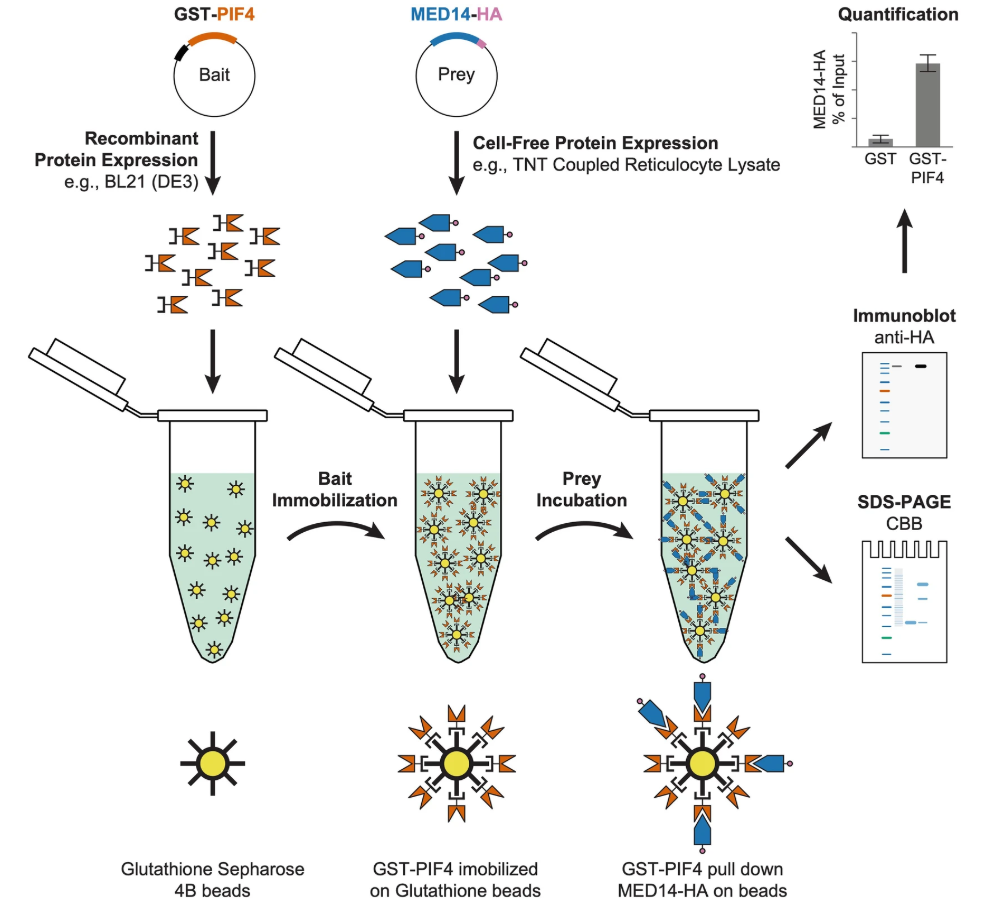GST Pull Down Assay Service
- Use high-purity recombinant proteins, verified by SDS-PAGE and Western blotting.
- Store proteins under optimal conditions (e.g., appropriate temperature, buffer composition) to prevent degradation.
- Include protease inhibitors during protein preparation to protect against proteolysis.
- Include appropriate blocking agents (e.g., BSA, fish gelatin) to minimize non-specific binding.
- Use stringent washing steps with high-salt or detergent-containing buffers to remove non-specifically bound proteins.
- Incorporate negative controls, such as GST alone, to identify and account for non-specific interactions.
- Optimize incubation time to allow adequate binding without causing protein degradation.
- Conduct incubations at temperatures that preserve protein activity, typically 4°C for sensitive proteins or room temperature for more stable interactions.
- Choose Co-IP when you aim to investigate endogenous protein interactions within their native cellular environment, especially when post-translational modifications play a critical role.
- Opt for GST Pull Down Assays when you need to identify direct binding partners of a bait protein in a controlled in vitro setting, particularly useful for mapping interaction domains and conducting structural analyses.
Unlocking the complexities of protein-protein interactions is fundamental to advancing our understanding of cellular mechanisms, signaling pathways, and disease processes. The GST Pull Down Assay is a technique that uses Glutathione S-Transferase (GST) fusion proteins to isolate target proteins and their binding partners from diverse biological samples, enabling the precise identification and characterization of protein-protein interactions. At MtoZ Biolabs, our GST Pull Down Assay Service harnesses state-of-the-art proteomic technologies to deliver accurate and comprehensive insights into protein networks. Whether your research focuses on elucidating signal transduction pathways, investigating disease-related interactions, or identifying novel drug targets, our expert team ensures reliable and reproducible results tailored to your specific scientific needs.
The GST Pull Down Assay is an essential biochemical technique for investigating protein-protein interactions (PPIs) in a controlled in vitro environment. This method enables researchers to identify and characterize interactions between proteins and other biomolecules with high specificity and reliability. The process of GST Pull Down Assay begins by immobilizing a bait protein, fused with Glutathione S-Transferase (GST), onto a solid support. This setup is then incubated with a cell lysate or purified sample containing potential interacting partners. Through specific affinity interactions, such as GST-glutathione binding, the bait protein and its binding partners are effectively captured and isolated. Subsequent analysis of the pulled-down proteins is performed using advanced techniques like Western blotting, mass spectrometry, or enzymatic assays, providing detailed insights into the interaction dynamics.

Figure 1. Schematic Outline of the GST Pull Down Assay Pipeline
Why Choose MtoZ Biolabs?
1. Advanced Analysis Platform: MtoZ Biolabs established an advanced GST Pull Down Assay Service platform, guaranteeing reliable, fast, and highly accurate analysis service.
2. Comprehensive Control Groups: Implement multiple controls to eliminate interference and ensure result reliability.
3. High-Data-Quality: Deep data coverage with strict data quality control. AI-powered bioinformatics platform integrates all GST pull down assay data, providing clients with a comprehensive data report.
4. One-Stop Service: Offer end-to-end solutions from GST protein preparation to protein interaction detection.
5. One-Time-Charge: Our pricing is transparent, no hidden fees or additional costs.
Applications
1. Mapping Protein Interaction Networks
Use the GST Pull Down Assay to identify and characterize the complex web of protein-protein interactions that regulate cellular functions, providing a comprehensive map of interaction networks essential for understanding biological processes.
2. Signal Transduction Pathway Analysis
Investigate the key components and interactions within cellular signaling pathways with the help of GST Pull Down Assay to elucidate the mechanisms by which signals are transmitted and regulated within cells.
3. Drug Target Identification
Leverage the GST Pull Down Assay Service to discover and validate potential therapeutic targets by uncovering protein interactions involved in disease pathways, facilitating the development of targeted treatments.
4. Validation of High-Throughput Screening Results
Confirm and validate protein interactions identified through high-throughput methods such as yeast two-hybrid screens or mass spectrometry-based approaches with GST Pull Down Assay, ensuring the reliability of initial findings.
5. Transcription Factor Interaction Studies
Examine interactions between transcription factors and other regulatory proteins, shedding light on the mechanisms of gene expression regulation and transcriptional control.
6. Disease-Related Protein Complex Investigation
Explore the formation and dynamics of protein complexes implicated in various diseases with the GST Pull Down Assay Service, offering insights into disease mechanisms and potential avenues for therapeutic intervention.
FAQ
Q1: What Challenges Might Arise During GST Pull Down Assay, and What Solutions are Available?
1. Protein Purity and Quality
Impurities or degradation of the bait or prey proteins can lead to non-specific interactions and unreliable results in the GST Pull Down Assay.
⭐ Solution:
2. Non-Specific Binding
Non-specific interactions between proteins and the affinity matrix can lead to false-positive results in GST Pull Down Assay experiments.
⭐ Solution:
3. Incubation Time and Temperature
Insufficient or excessive incubation time and inappropriate temperatures can affect binding kinetics and protein stability during the GST Pull Down Assay.
⭐ Solution:
Q2: When Should I Use Co-IP Versus GST Pull Down Assays?
Both Co-Immunoprecipitation (Co-IP) and GST Pull Down assays are invaluable tools for studying protein-protein interactions, each with its unique strengths and limitations.
MtoZ Biolabs, an integrated Chromatography and Mass Spectrometry (MS) Services Provider, provides advanced proteomics, metabolomics, and biopharmaceutical analysis services to researchers in biochemistry, biotechnology, and biopharmaceutical fields. Our GST Pull Down Assay Service is designed to provide high-throughput, cost-effective solutions with exceptional data quality and minimal sample consumption. Free project evaluation, welcome to learn more details.
MtoZ Biolabs, an integrated chromatography and mass spectrometry (MS) services provider.
Related Services
How to order?







